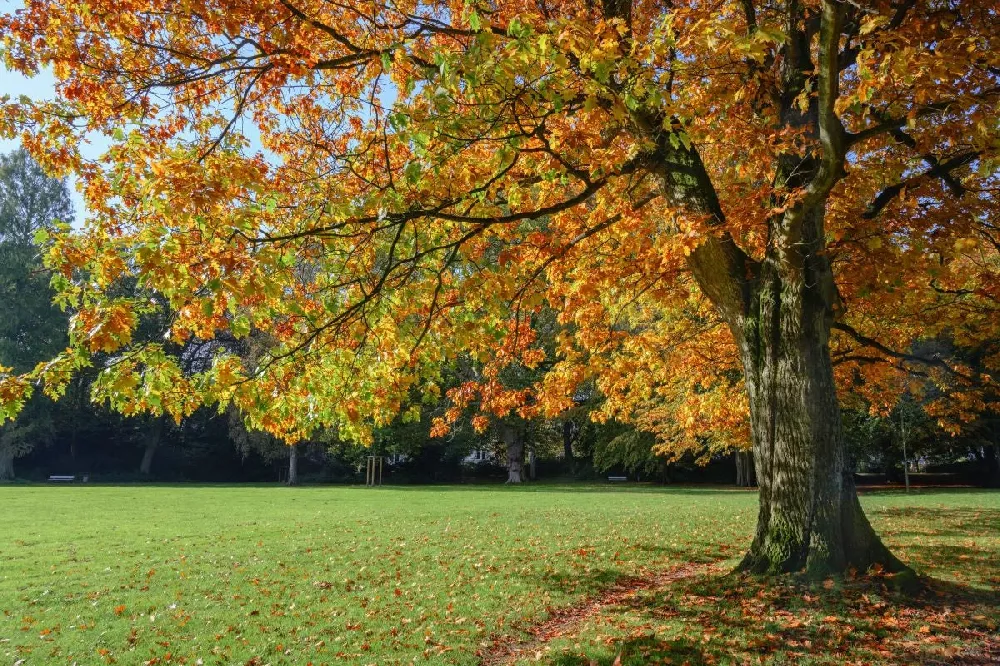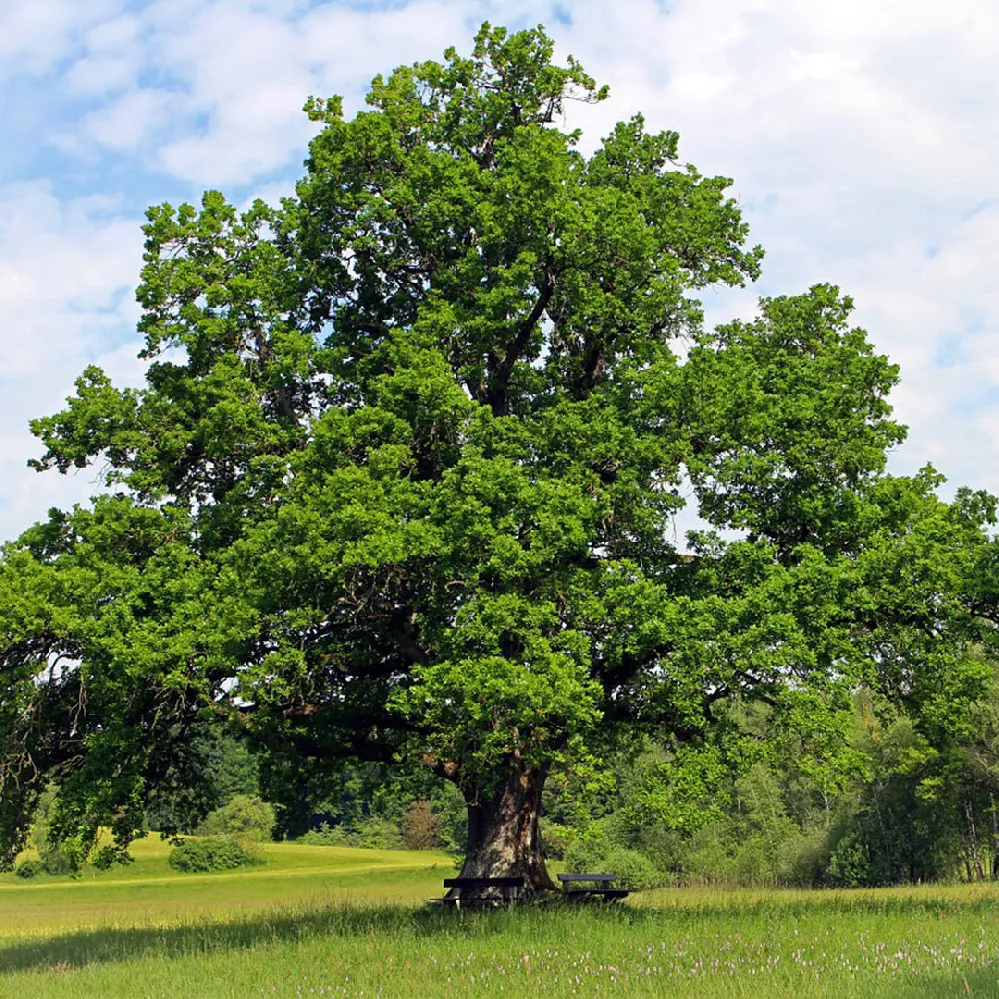- Home >
- Ornamental Trees >
- Willow Oak Tree
Willow Oak Tree for Sale - Buying & Growing Guide
- Ships in 1-2 days
- 1-Year Warranty Eligible
- Pots or accessories are not included unless specified in the product options.
Shipping Details:
Once your order is shipped, you’ll receive an email with a tracking number and estimated delivery date. Most orders ship immediately, but some items are seasonal and may only ship in spring or fall. These products are noted on the website.
The best word to describe a Willow Oak Tree, Quercus phellos, might just be "majestic." These handsome trees are members of the oak family, and thus are sturdy and easy to grow. Their leaves, however, are surprisingly willow-like, giving the tree its name. They are fast-growing trees and can quickly fill a large space in a landscape, offering a stately presence throughout the year. They are not picky about soil type and can even handle areas that are prone to flooding or are swampy in springtime. The bright green, upswept leaves put on their best show in fall when they turn a lovely russet. The acorns, meanwhile, provide food for wildlife and birds. If you have a larger lawn that can handle a tree of its size, the Willow Oak makes an impressive specimen tree. Here are a few more reasons to consider adding it to your garden:
- Branches are strong and resist cracking or breaking in high winds or heavy snowfall.
- Tolerates urban pollution well.
- Native to the southern and eastern states.
Plant Care
Sunlight

The Willow Oak Tree does best in full sunlight, at least six to eight hours of direct light a day.
Watering
Water newly-planted trees regularly; a mature tree only needs watering in very dry conditions.
Fertilizing

Fertilize in spring with a balanced, slow-release product designed for landscape trees and shrubs.
Planting and Care
Planting instructions
Site your tree in soil that drains well and receives at least six hours of direct sunlight a day. Note that a mature Willow Oak is a large tree, so allow plenty of room around it and avoid planting it under overhead utility wires. Unpot your sapling and tease out any encircling roots, which can girdle the tree and slowly kill it. Dig a hole that’s as deep as the root ball and twice as wide. Place the tree in the hole, spreading out the roots. Holding it upright and steady, fill in around the roots with topsoil, tamping down as you go to eliminate air pockets. Water thoroughly. Apply a two to three-inch layer of organic mulch such as bark chips to the root zone to conserve moisture and hinder weed growth but keep it from touching the trunk to avoid problems with rot.
Watering and nutrients
Water newly-planted and young trees once a week for the first year. Once the tree is established and growing strongly, you can cut back on watering. A mature tree only needs supplemental watering if you receive less than an inch of rain a month. Fertilize in spring with a balanced, slow-release product designed for landscape trees and shrubs, such as a 10-10-10 formula.
Pollination
Willow Oak has small yellow flowers that appear on catkins in spring. These, when pollinated by insects, lead to rounded acorns, which are a good food source for small mammals and birds.
Pruning
Prune in spring when young to shape the tree. Cut out any dead, diseased or damaged limbs whenever you see them. A mature tree shouldn’t need any significant pruning.
Pests, diseases and animals
Pests that may occur on oak trees include scale insects, leaf miners and oak lace bugs. However, oaks are generally pest-resistant, and a minor infestation shouldn’t bother your tree. If insect pressure is severe, consider releasing beneficial insects such as ladybugs and lacewings. Diseases of the oak include oak wilt, anthracnose and powdery mildew. These are most likely to attack trees that are already in poor health and can be largely avoided by proper care. Animals that are attracted to your Willow Oak include squirrels and other small mammals and birds, which thrive on the acorns in fall and winter.
Achieving maximum results
You can achieve maximum results with the Willow Oak by using it appropriately in your garden or landscape. It is best suited to be used as a stately specimen tree, standing in splendor in a front yard or on a rolling hillside. It can be very effective when a line of these trees are planted alongside a long, winding driveway or in a row near a road or paved area. Because of its size, it is best suited to large expanses of land and might not work as well in a smaller urban lot. One feature of this tree that can be exploited is its affinity for marshy or swampy ground. If you have a pond or stream on your property, Willow Oak should grow well near it, unlike many other trees.
FAQs
How big does a Willow Oak get?
A Willow Oak has a mature height of 40 to 60 feet with a mature width of 30 to 40 feet. Proper spacing is essential with this tree, which is a fast grower; so, take this into consideration when you are choosing a planting site.
Where can I grow a Willow Oak?
Willow Oak is hardy down to -10 degrees Fahrenheit; so, it can be grown as far north as coastal New England. It also grows well in southern states and is even able to be grown throughout southern Texas and Louisiana as well as all but the most southern portions of Florida.
Is Willow Oak a messy tree?
No more so than any other deciduous tree. The leaves will drop in fall after a spectacular autumn display of color, but these are easily raked up or allowed to break down and add compost to the soil surrounding the tree. Acorns will also drop but are usually picked up by animals for whom they are a primary winter food source.
Compare Similar Products
You can't add more Product Name - Product size to the cart.
OK










